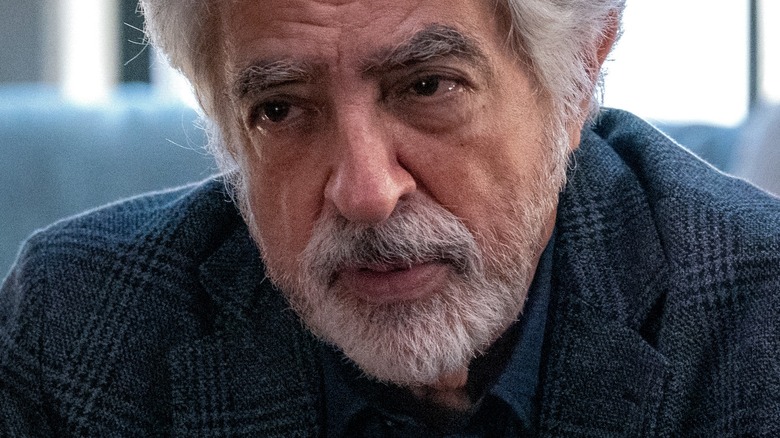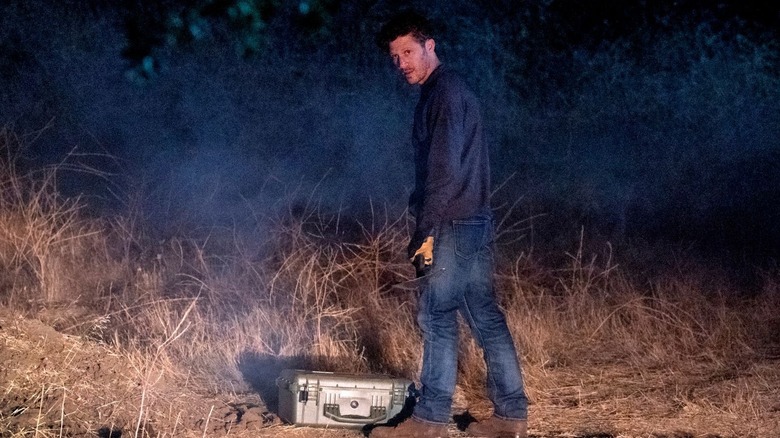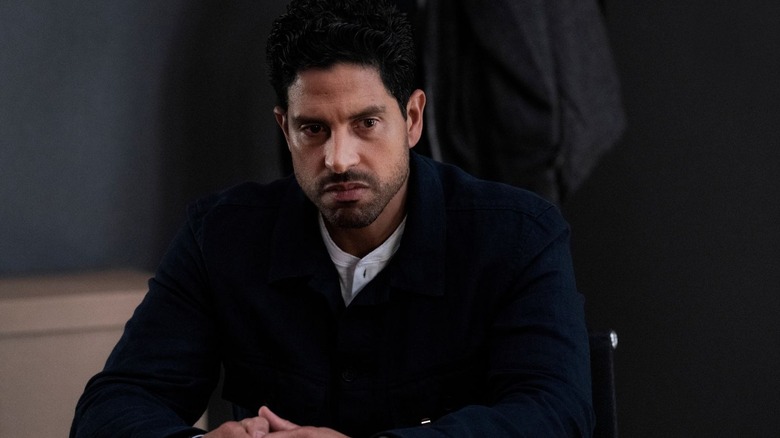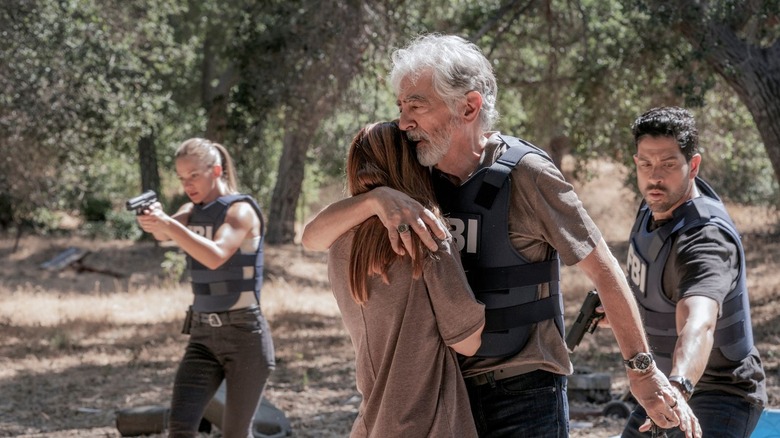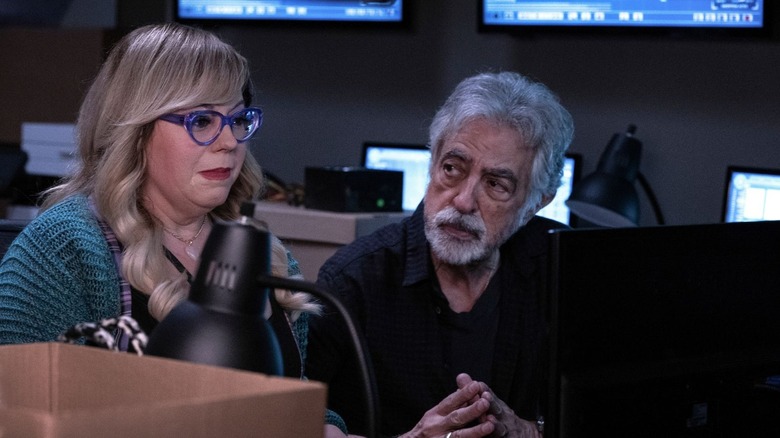Criminal Minds: Evolution Has The Wrong Title
In 2017, the scholarly journal BioScience published an academic study titled "Frankenstein and the Horrors of Competitive Exclusion." As far as academic titles go, its actually quite vibrant. The study proposed that Mary Shelley correctly predicted a theory of evolution in the 1800s that scientists wouldn't develop until the 1930s. In the novel, Victor Frankenstein theoretically avoids "competitive exclusion" by declining to build a second creature lest the two should procreate and compete with the human race for resources.
The lesson? Sometimes it's best to leave it at one.
The Paramount+ series "Criminal Minds: Evolution" resembles Frankenstein's monster in a number of ways. Part sequel, part spin-off, part reboot, it serves little function other than to wreak havoc on the townspeople with the unwieldy corpse of a series exhausted by fifteen seasons on CBS. Staring at the series' title, it's hard not to ask the obvious question — that is, what about "Criminal Minds: Evolution" has actually, well, evolved?
The promise of change is certainly there, but the show curiously chooses to dwell on its most frustrating alterations while rushing to resolve compelling storylines as quickly as possible. The characters keep "Criminal Minds" in a disappointing stasis — the subject matter, on the other hand, drags it into the depths of naive regression.
Elias Voit personifies imitation -- not evolution
Almost immediately, "Criminal Minds: Evolution" makes its thesis clear — criminals have "evolved" because of technology. Aside from the fact that the show traffics in a vague sort of paranoia that would make local news stations blush, it's a silly fixation for a series that has always enjoyed using technology and the internet as catch-all boogeymen. As interesting a package as big bad Elias "Sicarius" Voit (Zach Gilford) might be, what he delivers fails to make good on the series' titular promise.
Throughout the first two episodes, Voit is presented as this Dexter Morgan-esque criminal genius, the likes of which the BAU has never seen. He is, for the purposes of the series, the personification of criminal evolution. Yet through its own lore, the show unravels any kind of prestige its core villain could gain.Is Voit "evolved" because he's grown a massive online network? It's hard to see why, considering Season 11 featured a network of hitmen brought together by the Silk Road. In fact, the conceit of a murderous online community was used by the show as early as Season 5's "The Internet Is Forever." So, what is it that makes him more dangerous, exactly? Is it the "kill-kits" or the storage containers, murder tools used by real-life killers in the 2010s? What makes Voit the harbinger of a new generation of criminals when all his gimmicks are old hat?
It's a question the series has yet to answer in any satisfying capacity.
The show's depiction of technology is ridiculous
Perhaps the audience could forgive a degree of retreading, if the series weren't also intent on retreading its laughably loose understanding of technology.
With the series' chosen focus, its somewhat understandable that resident superhuman-tech-genius Penelope Garcia (Kirsten Vangsness) receives a fair amount of narrative play. Yet, every time she logs onto her laptop to save the day, it's impossible to take her seriously — as she furiously types nonsense and glares at random scrolling characters. It's hard to regain authority over your audience when you disrupt the gritty crime-drama to show Neo hacking into the Matrix.
Meanwhile, Garcia's peers in the field seem relatively unfazed by these newfangled technology crimes. In "Sicarius," the BAU hunts down an emasculated Alpha-male who preys on married couples (if that sounds familiar, check out Season 6's "Compromising Positions"). With a political figure in custody, Luke Alvez (Adam Rodriguez) discovers that the unsub is catfishing his victims (see Season 10's "The Hunt"). Alvez figures this out by glancing at a shirtless photo so obviously fake it borders on comical, grumbling about a reverse image search, and miraculously tracing the image back to a prehistoric looking website by swiping around haphazardly at his iPhone — all in less than five seconds, I might add. Aside from the ridiculousness of the sequence, it's just hard to believe that several adults in quick succession would be susceptible to a scheme so obvious in a post-"Catfish" world. For a show that desperately needs its audience to take technology seriously, it constantly mushes the concept into something unrecognizable and unrelatable.
Criminal Minds: Evolution missed a chance to evolve in more ways than one
This issue has design and scripting aspects to it, certainly, but it also feels foundational. Maybe it's too much to ask for a 20-year-old show with a relatively active fan base to reinvent itself — to do more than play the hits. Still, the real missed opportunity for "Criminal Minds: Evolution" is not in the show's failure to depict new or accurate technology, but in its built-in narrative constraints.
The show's true "evolution" could have been one of structure, pacing, and character development. With a two-year break and a jump to streaming, "Criminal Minds" had an opportunity to transform from a uniquely grotesque procedural into a strong, narrative driven crime-drama. Through its controversial subject matter, the series is poised to tackle tough questions — and for a moment, it seems as though "Evolution" actually will. Garcia begins the series fully retired from the BAU, and for very good reason. No amount of hacking the mainframe can heal Garcia's overwhelming amount of emotional trauma, which she passively absorbed through years of confronting humanity's darkest corners. Meanwhile, Detective David Rossi (Joe Mantegna), lost his wife to cancer during the pandemic. Engulfed in grief, he throws himself into an endless and disturbing homicide investigation.
As Rossi moves throughout the series' early moments like an angry ghost, "Evolution" makes an incredibly good case for why he and Garcia should fully remove themselves from law enforcement. It's a difficult arc that could take the series more than a season to fully resolve. Unfortunately, the series itself won't give them room for that.
It might be time to grab the pitchforks
To make room for the series' standard monster-of-the-week format, character development has to take a backseat to plot — not story, plot. The story of Rossi and Garcia wrestling with whether or not to return to work can't take place naturally or resolve in any interesting, radical way because the plot needs them to fulfill their normal roles at the BAU. By constraining itself this way, the series unintentionally contradicts its own sound messaging, instead conveying that trauma actually does make you stronger and that working through it is a heroic act without consequence.
It's a shame too, because Gilford and the writers have afforded enough charisma and complexity to Voit for him to be the season's sole villain. In addition to being a refreshing structural departure for the series, eliminating the need to establish a new killer every week would leave space for Rossi and Garcia to develop in ways that threaten the show's status quo.
What if Rossi's trauma makes him worse at his job? What if Rossi essentially forcing Garcia to return harms their relationship, or scars her in a way that can't be easily fixed? These questions are far more interesting because they are a real, existential threat for the characters beyond just getting murdered by an unsub. Instead, however, the series is content to repeat old plot points and waste intriguing storylines in service of a truly imperceptible goal.
What does this series hope to accomplish, beyond excavating the decaying body parts of a dead show and mangling them into something familiar? Beyond extending its already bloated lifespan? It's hard to say. As Frankenstein curbed the natural potential of his unnatural creation, so have the architects of this ill-intentioned revival. Barring a dramatic shift in coming episodes, the hopes of witnessing any true evolution of the "Criminal Minds" formula are depressingly grim.
